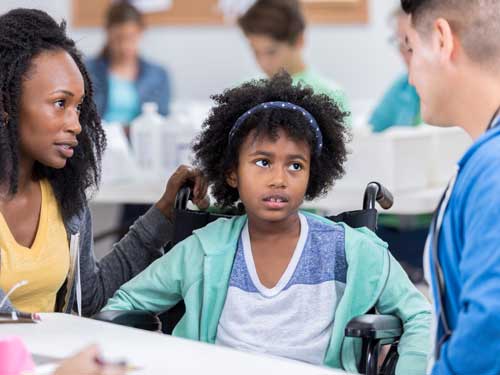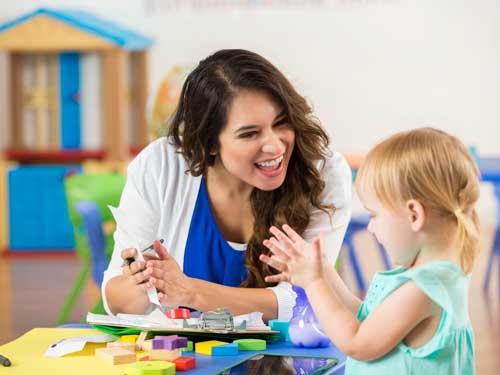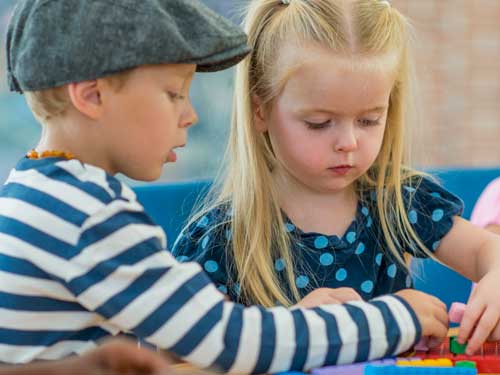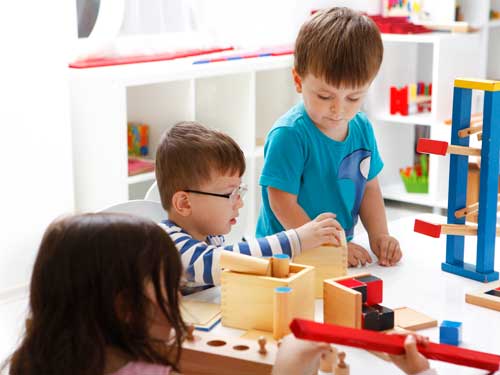




If the setting has adopted a method of working that reflects the 'child-centred' approach, it will always put the child at the centre of the learning process and meet the needs of each individual child. This means looking at things from the child's perspective, allowing them to participate in planning activities and events within the society.
A central focus on the child can involve looking at the child's interests and the experiences they've already received, and listening to their ideas. The children will then become part of the planning. The childcare worker's role is to give the children choices. This is a basis to ensure that the child develops independently to be able to form their own opinion.
You have already studied United Nations Convention on the Rights of the Child articles, and adults working with children and young people are duty-bound to ensure that these rights are central to each child's daily life.
Os yw’r lleoliad wedi mabwysiadu dull o weithio sy’n ystyried y dull plentyn-ganolog, mae bob amser yn rhoi’r plentyn yng nghanol y broses dysgu gan gwrdd ag anghenion pob plentyn unigol. Golyga hyn fod rhaid edrych ar bethau o bersbectif y plentyn sy’n caniatáu iddynt gymryd rhan wrth gynllunio gweithgareddau a digwyddiadau o fewn y gymdeithas.
Wrth ganolbwyntio ar y plentyn yn ganolog gellir edrych ar ddiddordebau’r plentyn, y profiadau maent eisoes wedi derbyn a gwrando ar eu syniadau. Trwy wneud hyn bydd y plant yn rhan o’r cynllunio. Rôl yr ymarferwr yw rhoi dewisiadau i’r plant. Mae hyn yn sail ar gyfer sicrhau bod y plentyn yn datblygu’n annibynnol i fedru llunio barn ei hunan
Rydych eisoes wedi astudio erthyglau Confensiwn Cenhedloedd Unedig ar Hawliau’r Plentyn ac mae gan oedolion sy’n gweithio gyda phlant a phobl ifanc ddyletswydd i sicrhau fod yr hawliau yma yn ganolog i fywyd dyddiol pob plentyn.
Pam mae dull gweithredu ‘plentyn - ganolog’ yn bwysig?
Drag the words from the list and put them in the correct space in the sentences.
Llusgwch y geiriau o’r rhestr a’u gosod yn y bwlch cywir yn y brawddegau.
You scored … out of . Move some of the terms around to try to improve your score.
Well done. You scored … out of .
You scored … out of . Click reset to try the activity again.
You scored … out of . Move some of the terms around to try to improve your score.
Well done. You scored … out of .
You scored … out of . Click reset to try the activity again.
Mae gennych … allan o yn gywir. Symudwch rhai o'r termau o gwmpas i geisio gwella eich sgôr.
Da iawn. Mae gennych … allan o yn gywir.
Mae gennych … allan o yn gywir. Cliciwch ‘ailosod’ er mwyn rhoi cynnig arall ar y gweithgaredd.
Mae gennych … allan o yn gywir. Symudwch rhai o'r termau o gwmpas i geisio gwella eich sgôr
Da iawn. Mae gennych … allan o yn gywir.
Mae gennych … allan o yn gywir. Cliciwch ‘ailosod’ er mwyn rhoi cynnig arall ar y gweithgaredd.

To work in a professional way, it's important to build a good relationship with children and their families/carers.
When cooperating with children it's important to respond to their requirements and pay attention to individual needs. This will allow the children to feel at home which contributes to the development of their self-confidence. Effective communication promotes a positive environment with the aim of providing the best service to children and young people.
The parent/carer is usually the child's primary carer and they know more about the child than anyone else. They have an understanding of what their children can do and are an integral part of their children's learning process.
When a child starts attending an early years setting perhaps parents/carers might feel left out. It's important that the childcare worker involves them in decisions about their children. Confident communication is needed when discussing the children's progress. This will make them feel respected and valued. Parents/carers have a lot to offer as they have skills and experiences that can be shared.
Os am weithio mewn ffordd broffesiynol mae’n bwysig adeiladu perthynas dda gyda phlant a’u teuluoedd/gofalwyr.
Wrth gydweithio gyda phlant mae’n bwysig ymateb i’w gofynion gan roi sylw i anghenion unigol. Bydd hyn yn caniatáu’r plant i deimlo’n gartrefol sydd yn cyfrannu tuag at ddatblygu eu hunanhyder. Mae cyfathrebu effeithiol yn hybu amgylchedd positif gyda’r nod o ddarparu’r gwasanaeth orau i blant a phobl ifanc.
Y rhiant/gofalwr, rhan amlaf yw gofalwr cyntaf y plentyn ac maent yn gwybod mwy am y plentyn na neb arall. Mae ganddynt ddeallusrwydd o’r hyn mae eu plant yn medru gwneud ac maent yn rhan annatod o broses dysgu eu plant.
Pan fydd plentyn yn cychwyn mewn lleoliad blynyddoedd cynnar efallai bydd y rhieni/gofalwyr yn teimlo eu bod yn cael eu gadael allan. Mae’n bwysig bod yr ymarferwr yn eu cynnwys wrth wneud penderfyniadau am eu plant. Mae angen medru cyfathrebu’n hyderus wrth drafod cynnydd y plant. Trwy hyn byddant yn teimlo eu bod yn cael eu parchu a’u gwerthfawrogi. Mae gan rieni/gofalwyr lawer i’w gynnig gan eu bod yn meddu ar sgiliau a phrofiadau y gellir eu rhannu.
Drag the words from the list and put them in the correct space in the sentences.
Llusgwch y geiriau o’r rhestr a’u gosod yn y bwlch cywir yn y brawddegau.
You scored … out of . Move some of the terms around to try to improve your score.
Well done. You scored … out of .
You scored … out of . Click reset to try the activity again.
You scored … out of . Move some of the terms around to try to improve your score.
Well done. You scored … out of .
You scored … out of . Click reset to try the activity again.
Mae gennych … allan o yn gywir. Symudwch rhai o'r termau o gwmpas i geisio gwella eich sgôr.
Da iawn. Mae gennych … allan o yn gywir.
Mae gennych … allan o yn gywir. Cliciwch ‘ailosod’ er mwyn rhoi cynnig arall ar y gweithgaredd.
Mae gennych … allan o yn gywir. Symudwch rhai o'r termau o gwmpas i geisio gwella eich sgôr
Da iawn. Mae gennych … allan o yn gywir.
Mae gennych … allan o yn gywir. Cliciwch ‘ailosod’ er mwyn rhoi cynnig arall ar y gweithgaredd.

Article 12 of the United Nations Convention on the Rights of the Child states 'Children have the right to say what they think should happen, when adults are making decisions that affect them, and to have their opinions taken into consideration.
It's important that every child has the opportunity to have their say, make choices and take control in order to be able to influence service provision. If children are listened to and given freedom to make decisions, they will grow independently to be able to control their learning. Children and young people who are given freedom can concentrate and enjoy what they do. The childcare worker's role is to listen to the child's voice to understand their needs and choices. They need to communicate openly with children and young people and be willing to adjust their practices to accept the opinions of others.
This will provide many benefits for children and young people, including:
National Participation Standards ensure that children and young people have a voice and a choice.
Dywed Erthygl 12 o Gonfensiwn y Cenhedloedd Unedig ar Hawliau’r Plentyn ‘Mae gan blant yr hawl i ddweud eu barn ynghylch yr hyn a ddylai ddigwydd pan fo oedolion yn gwneud penderfyniadau sy’n effeithio arnyn nhw, ac i’w barn gael ei hystyried’.
Mae’n bwysig bod pob plentyn yn cael cyfle i leisio eu barn, gwneud dewisiadau a chymryd rheolaeth er mwyn gallu dylanwadu ar ddarpariaeth gwasanaethau. Trwy wrando ar lais y plentyn a rhoi rhyddid iddynt wneud penderfyniadau byddant yn tyfu’n annibynnol i fedru rheoli eu dysgu. Wrth roi rhyddid i blant a phobl ifanc byddant yn canolbwyntio a mwynhau'r hyn maent yn gwneud. Rôl yr ymarferwr yw gwrando ar lais y plentyn er mwyn deall eu hanghenion a’u dewisiadau. Mae angen cyfathrebu yn agored gyda phlant a phobl ifanc, a bod yn barod i addasu arfer i dderbyn barn eraill.
Sut gall plant a phobl ifanc leisio eu barn?
Bydd hyn yn rhoi llawer o fuddion i blant a phobl ifanc, gan gynnwys:
Mae Safonau Cyfranogiad Cenedlaethol yn sicrhau bod plant a phobl ifanc yn cael llais a chael dewis.
Drag the provision to match their correct description.
Llusgwch y ddarpariaeth i’r disgrifiad cywir.
Warning! This resource is not optimised for use on mobile devices.
Rhybudd! Ni ellir defnyddio’r adnodd yma ar ffonau symudol neu dabled.
Well done. You have matched them all correctly.
Da iawn. Rydych wedi paru pob un yn gywir.
|
Provision
Darpariaeth
|
Description
Disgrifiad
|
Correct answers
Atebion Cywir
|
|---|

It's essential that children and young people's care worker knows their background to be able to provide appropriately for them.
A child’s background can include a unique mix of the child’s experience, history, culture, beliefs, preferences, family/carers relationships, informal networks and community.
Getting to know children and young people's background will enable you to understand their circumstances and consider what's best for them. The most important person in a child's life is the parent/carer. Parents/carers' wishes, traditions, culture and beliefs must be respected, even if they're different to our beliefs. A child’s background can include a unique mix of the child’s experience, history, culture, beliefs, preferences, family/carers relationships, informal networks and community.
Experiences: Not all children have had much of an opportunity to learn through their experiences and it's important that childcare workers give children and young people these opportunities. However, some children have extensive experiences that need to be acknowledged in order to expand their learning.
Language: Children's language will vary depending on their cultural background. Some children can communicate using more than one language while others have difficulty coping with using one language confidently. The aim is to ensure understanding to be able to communicate effectively.
Culture and beliefs: Children come from a number of different cultural backgrounds and the childcare worker has a role to ensure that they meet everyone's needs. Getting to know their culture allows their traditions to be celebrated as these are meaningful to them.
Family/carers structure: How families/carers live can vary and this can influence the lives of children and young people. Family/carers structure can include:
Nuclear family/carers - a family/carers group where only parents live with the children.
Extended family/carers - where parents and other family/carers members live together.
One parent family/carers - where one parent/carer cares for the children.
Same-sex family/carers - where a same-sex couple cares for the children.
Adoptive family/carers - where children have been adopted or fostered.
Reorganised family/carers - where children may live with one biological parent and a step-parent, half-brothers and sisters.
Communal family/carers - where children live in communes with their parents.
Nomadic family/carers - families/carers that travel from one place to another with their children.
Choices: Not every child and young person likes having choices. It's important that children have opportunities to adopt this skill as it will increase their self-confidence which in turn contributes towards their self-esteem.
Mae’n hanfodol bod gweithiwr gofal plant a phobl ifanc yn gwybod beth yw eu cefndir er mwyn medru darparu yn briodol ar eu cyfer. Gall cefndir amrywio i gynnwys profiadau’r plentyn, iaith, diwylliant, credoau, strwythur teuluol a’r dewisiadau mae plant yn gwneud.
Mae dod i adnabod cefndir plant a phobl ifanc yn eich galluogi i ddeall eu hamgylchiadau ac ystyried beth sy’n bwysig iddynt. Y person pwysicaf ym mywyd plentyn yw'r rhiant/gofalwr. Rhaid parchu dymuniadau, traddodiadau, diwylliant a chredoau'r rhieni/gofalwyr, hyd yn oed os ydynt yn wahanol i'n credoau ni. Oes angen bwlch rhwng "wahanol" ac "i'n"?
Profiadau: Nid yw pob plentyn wedi cael llawer o gyfle i ddysgu trwy eu profiadau ac mae’n bwysig bod gweithwyr gofal plant yn rhoi'r cyfleodd yma i blant a phobl ifanc. Serch hynny mae gan rai plant brofiadau helaeth sydd angen eu cydnabod er mwyn ehangu eu dysgu.
Iaith: Mae iaith plant yn amrywio ac yn dibynnu ar eu cefndir diwylliannol. Mae rhai plant yn medru cyfathrebu trwy ddefnyddio mwy nag un iaith tra bod eraill yn cael anhawster ymdopi â defnyddio un iaith yn hyderus. Y nod yw sicrhau deallusrwydd i fedru cyfathrebu’n effeithiol.
Diwylliant a chredoau: Mae plant yn dod o nifer o gefndiroedd diwylliannol gwahanol ac mae gan yr ymarferwr rôl i sicrhau eu bod yn cwrdd ag anghenion pawb. Trwy adnabod eu diwylliant gellir dathlu eu traddodiadau gan fod y rhain yn ystyrlon iddynt hwy.
Strwythur teuluol: Gwelir amrywiaeth o ran sut mae teuluoedd/gofalwyr yn byw a gall hyn ddylanwadu ar fywydau plant a phobl ifanc. Gall y strwythur teulu/gofalwyr gynnwys;
Teulu/gofalwyr cnewyllol - grŵp teuluol lle mae rhieni yn unig yn byw gyda’r plant.
Teulu/gofalwyr estynedig - lle mae rhieni ac aelodau eraill o’r teulu/gofalwyr yn byw gyda’i gilydd.
Teulu/gofalwyr un rhiant/gofalwr - lle mae un rhiant/gofalwr yn gofalu am y plant.
Teulu/gofalwyr o’r un rhyw - cwpl o’r un rhyw sy’n gofalu am y plant.
Teulu/gofalwyr mabwysiadol - lle mae’r plant wedi cael eu mabwysiadu neu faethu.
Teulu/gofalwyr ad-drefnedig - lle gall blant fyw gydag un rhiant/gofalwr naturiol a llys-riant/gofalwr, hanner-brodyr a chwiorydd
Teulu/gofalwyr cymunedol - lle mae’r plant yn byw mewn comiwnau gyda'u rhieni.
Teulu/gofalwyr nomadig - teuluoedd/gofalwyr sy’n teithio o fan i fan gyda’u plant.
Dewisiadau: Nid yw pob plentyn a phobl ifanc yn hoffi cael dewisiadau. Mae’n bwysig bod plant yn cael cyfleoedd i fabwysiadu’r sgil hwn gan y bydd yn cynyddu eu hunanhyder sydd yn ei dro yn cyfrannu tuag at eu hunan-barch.
As well as different cultures, children and young people live in different family/carers structures. This shows children how everyone's backgrounds can differ.
Drag the family/carers type to match their correct description
Yn ogystal â diwylliannau gwahanol mae plant a phobl ifanc yn byw o fewn strwythur teuluol gwahanol. Mae hyn yn dangos i blant sut mae cefndiroedd pawb yn medru gwahaniaethu.
Llusgwch y math o deulu/gofalwyr i’r disgrifiad cywir.
Warning! This resource is not optimised for use on mobile devices.
Rhybudd! Ni ellir defnyddio’r adnodd yma ar ffonau symudol neu dabled.
Well done. You have matched them all correctly.
Da iawn. Rydych wedi paru pob un yn gywir.
|
Family/carers type
Math o deulu/gofalwyr
|
Description
Disgrifiad
|
Correct answers
Atebion cywir
|
|---|
Drag the family/carers type to match their correct description.
Llusgwch y math o deulu/gofalwyr i’r disgrifiad cywir.

A child's background can vary to include experiences, language, culture, beliefs, family/carers structure and decisions made by children.
Experiences: Children need an opportunity to role play and assess risks for themselves in order to learn from their mistakes. They need to actively participate in their learning in order to be able to learn for themselves. It's important to encourage children to be creative, enjoy all the resources and play a different role in their play. Children will often find learning hard if they haven't had an opportunity to play.
Language: The child's language and communication skills need to be developed to a level that will enable them to actively participate in their learning. This can be done by sharing books and giving children an opportunity to discuss the characters. Picture books without words are an opportunity for children to make up a story to expand their language. Books and stories are a good way of drawing attention to different cultures e.g. images showing a minority ethnic group in traditional cultural situations. Bilingual books are also available to spark the interest of children and parents/carers.
Culture and beliefs: Children learn amongst their families/carers during the early years and are then influenced by friends, childcare workers and teachers. Exhibitions can be created to reflect different cultures in order to convey positive imagery to children and young people. It must be ensured that each child contributes to the exhibition. Music is a good way of allowing children to enjoy a variety of songs from all over the world.
This way of working with children gives them positive results and so it's important to acknowledge their wishes, choices and backgrounds.
Wrth ddarganfod cefndir plant a phobl ifanc gellir paratoi adnoddau a gweithgareddau yn llwyddiannus ar eu cyfer. Gall cefndir plentyn amrywio i gynnwys profiadau, iaith, diwylliant, credoau, strwythur teuluol a’r dewisiadau mae plant yn gwneud.
Profiadau: Nid yw pob plentyn wedi cael llawer o gyfle i ddysgu trwy eu profiadau ac mae’n bwysig bod gweithwyr gofal plant yn rhoi'r cyfleoedd hyn i blant a phobl ifanc. Mae angen i blant gael cyfle i chwarae rôl ac asesu risgiau eu hunain er mwyn dysgu o’u camgymeriadau. Mae angen iddynt gymryd rhan weithredol yn eu dysgu er mwyn gallu dysgu dros eu hunain. Mae'n bwysig annog plant i fod yn greadigol, mwynhau’r holl adnoddau a chymryd rôl wahanol o fewn eu chwarae. Yn aml, bydd plant yn ei chael hi'n anodd dysgu os nad ydynt wedi cael cyfle i chwarae.
Iaith: Mae iaith plant yn amrywio ac yn dibynnu ar eu cefndir diwylliannol. Mae rhai plant yn medru defnyddio mwy nag un iaith yn hyderus tra bod eraill yn cael anhawster ymdopi â dysgu un iaith. Mae angen datblygu sgiliau iaith a chyfathrebu’r plentyn i’r lefel a fydd yn eu galluogi i gymryd rhan weithredol yn eu dysgu. Gellir gwneud hyn trwy rannu llyfrau ble caiff blant gyfle i drafod y cymeriadau. Mae llyfrau lluniau heb eiriau yn gyfle i blant wneud stori i fyny er mwyn ymestyn eu hiaith. Mae llyfrau a storïau yn ffordd dda o dynnu sylw at ddiwylliannau gwahanol e.e. darluniau yn dangos grŵp ethnig lleiafrifol mewn sefyllfaoedd diwylliannol traddodiadol. Hefyd mae’n bosib cael llyfrau dwyieithog i annog diddordeb plant a rhieni/gofalwyr.
Diwylliant a chredoau: Mae plant yn dod o nifer o gefndiroedd diwylliannol gwahanol ac mae gan yr ymarferwr rôl i sicrhau eu bod yn cwrdd ag anghenion pawb. Mae plant yn dysgu ymysg eu teuluoedd/gofalwyr yn ystod y blynyddoedd cynnar ac yna maent yn cael eu dylanwadu gan ffrindiau, gweithwyr gofal plant ac athrawon. Gellir creu arddangosfeydd sy’n adlewyrchu diwylliannau gwahanol er mwyn cyfleu delweddau cadarnhaol i blant a phobl ifanc. Rhaid sicrhau bod pob plentyn yn cyfrannu tuag at yr arddangosfa. Mae cerddoriaeth yn ffordd dda i ganiatáu plant i fwynhau amrywiaeth o ganeuon ar draws y byd.
Mae’r ffordd o weithio gyda phlant yn rhoi canlyniadau positif iddynt ac felly mae’n bwysig cydnabod eu dymuniadau, dewisiadau a'u cefndiroedd angen atalnod.
Read the following scenarios and enter your comments in the appropriate space. Consider how the description can affect a child's confidence and development.
When you think you know the answer, click on the letters used to spell out the word. If you are correct that letter will turn green and will appear on the dashed line. If you are incorrect the letter will turn red and you will lose a life. You have 5 lives available to complete the activity.
Darllenwch y sefyllfaoedd isod a chofnodwch eich sylwadau yn y man priodol. Cofiwch ystyried yr effaith gall y disgrifiad gael ar hyder a datblygiad plentyn.
| QuestionCwestiwn | Your ResponseEich Ymateb | Suggested ResponseYmateb Awgrymedig |
|---|

Every child is different. Their needs and understanding vary, which can affect their self-respect. They have specific interests which need attention and by knowing their interests they will develop independence to make choices. By knowing children and young people's needs and extending and supporting their learning, the childcare worker will treat them with dignity and respect. This will enable the children to know themselves and develop confidently.
Children and young people will develop the knowledge that other people also have different needs and abilities. If the childcare worker talks, listens and thinks of other views around them, children and young people will learn a lot about how to build positive attitudes and values.
Childcare workers can treat children with dignity and respect by:
Mae pob plentyn yn wahanol. Mae eu hanghenion a’u dealltwriaeth yn amrywio sydd yn medru cael effaith ar eu hunan-barch. Mae ganddynt ddiddordebau penodol sydd angen cael sylw a thrwy adnabod eu diddordebau byddant yn datblygu annibyniaeth i wneud dewisiadau. Trwy adnabod anghenion plant a phobl ifanc ac ymestyn a chefnogi eu dysgu bydd yr ymarferwr yn eu trin ag urddas a pharch. Bydd hyn yn galluogi’r plant i adnabod eu hunain a datblygu yn hyderus.
Bydd plant a phobl ifanc yn datblygu’r deallusrwydd bod gan bobl eraill hefyd anghenion a galluoedd gwahanol. Os yw’r ymarferwr yn siarad, gwrando a meddwl am safbwyntiau eraill o’u cwmpas bydd plant a phobl ifanc yn dysgu llawer am y ffordd o feithrin agweddau a gwerthoedd cadarn.
Gall gweithwyr gofal plant drin plant ag urddas a pharch fel hyn:

It's important that childcare workers use the child-centred approach routinely. You have already learned how this approach has a positive effect on children and young people and its effective implementation is essential in every care setting for children and young people. Listed below are ways of working that support child-centred approaches.
Mae’n bwysig bod gweithwyr gofal plant yn arfer y dull gweithredu plentyn-ganolog yn rheolaidd. Rydych eisoes wedi dysgu sut mae’r dull hwn yn cael effaith bositif ar blant a phobl ifanc ac mae’n hanfodol ei fod yn cael ei fewn osod yn effeithiol ym mhob lleoliad gofal plant a phobl Ifanc.
Click on the answer you think is correct. The ‘next question’ button works when you have clicked on the correct amount of answers for that question.
Rhowch gynnig ar y dasg ganlynol trwy glicio a'r y dewis cywir. Mae’r botwm ‘cwestiwn nesaf’ yn gweithio pan rydych chi wedi clicio ar y nifer gywir o atebion ar gyfer y cwestiwn hwnnw.

'Activity' means completing a specific task. It's done as an individual or in a group.
'Experiences' means the process of observing, discovering or coming across something for the first time. The experience will be reinforced as the child comes across the same experience again, time after time. They will persevere with the task if they didn't succeed the first time.
The Children's Rights Charter specifies that every child should have the right to learn, play, relax and enjoy.
Ystyr ‘gweithgaredd’ yw cyflawni tasg benodol. Rhywbeth sy’n cael ei wneud fel unigolyn neu mewn grŵp.
Ystyr ‘profiadau’ yw'r broses o arsylwi, darganfod neu ddod ar draws rhywbeth am y tro cyntaf. Bydd y profiad yn cael ei atgyfnerthu wrth i’r plentyn ddod ar draws yr un profiad eto, dro ar ôl tro. Byddant yn dyfalbarhau gyda’r dasg os na wnaethant lwyddo y tro cyntaf.
Mae'r Siarter Hawliau Plant yn nodi y dylai pob plentyn gael yr hawl i ddysgu, chwarae, ymlacio a mwynhau.
It's important that children play a central part in activities and experiences. Complete the activity to show your understanding of how to ensure this.
Mae’n bwysig bod plant yn ganolog wrth gymryd rhan mewn gweithgareddau a phrofiadau. Cwblhewch y weithgaredd i ddangos eich dealltwriaeth o sut y gallwch sicrhau hyn.
How can the 'child-centred' approach be implemented successfully to the following activity/experiences?
Sut gall y dull 'plentyn-ganolog' gael ei roi ar waith yn llwyddiannus yn y gweithgaredd/profiadau canlynol?
| Activity/ExperiencesGweithgaredd/Profiadau | Your ResponseEich Ymateb | Suggested ResponseYmateb Awgrymedig |
|---|

It's important that children and young people have activities and experiences that are suitable for their age and development stage and give them pleasure. Activities and experiences should be customised to meet the needs of each individual child. Children will learn through play if the activity interests them. As a result, they will concentrate for longer. Using the child-centred learning method, the children will learn by doing rather than being taught.
Children and young people learn when they:
The childcare worker needs to support the children during the play process yet it's essential that they don't interfere excessively. By using the child-centred approach, children can benefit from activities and experiences that will fulfil their potential.
Mae’n bwysig bod plant a phobl ifanc yn cael gweithgareddau a phrofiadau sy’n addas ar gyfer eu hoed a’u cam datblygiad ac sydd yn rhoi pleser iddynt. Mae angen addasu’r gweithgareddau a’r profiadau er mwyn diwallu anghenion pob plentyn unigol. Bydd plant yn dysgu trwy chwarae os yw’r gweithgaredd o ddiddordeb iddynt . Yn sgil hyn byddant yn canolbwyntio am fwy o amser. Trwy ddefnyddio’r dull plentyn-ganolog o ddysgu bydd y plant yn dysgu trwy wneud yn hytrach na chael eu dysgu.
Mae plant a phobl ifanc yn dysgu pan:
Mae angen i’r ymarferwr gefnogi’r plant yn ystod y broses chwarae ond eto mae’n hanfodol nad ydynt yn ymyrryd yn ormodol. Trwy ddefnyddio’r dulliau gweithredu plentyn- ganolog gall blant fanteisio ar weithgareddau a phrofiadau a fydd yn cwrdd â’u potensial yn llawn.
Drag the activity and place it with the correct statement.
Llusgwch y gweithgaredd a’i osod gyda’r datganiad cywir.
Well done. You have matched them all correctly.
Da iawn. Rydych wedi paru pob un yn gywir.
|
Activity
Gweithgaredd
|
Why it is important to participate?
Pam mae'n bwysig cymryd rhan?
|
Correct answers
Ateb cywir
|
|---|

This means parents/carers' duty and responsibilities towards their children. Although they have rights, they must ensure that they acknowledge their children's moral, physical and emotional well-being. Parental responsibility applies until the child reaches eighteen years old. This is not the legal age in all countries. The Children Act 1989, on parental responsibility, emphasises that parents/carers have a specific duty in raising their children. It states, ‘In the Act “parental responsibility” means all the rights, duties, powers, responsibilities and authority which by law a parent/carer of a child has in relation to the child and his property.'
Under certain circumstances, parental responsibility may change if the child is thought to be in any risk, and this is a decision for the court.
Further reading
Family/carers permission must be obtained if the child/young person needs to take part legally in activities or changes that will affect lives. Matters requiring consent are:
In a situation where a child in your care needs urgent treatment and it's not possible to contact the parents/carers, e.g. perhaps a child has fallen at school and needs hospital treatment, the Children Act 1989 states that the situation must be dealt with sensibly in order to ensure the child's safety and well-being. Therefore, the parents/carers would need to be contacted as soon as possible and parental consent would HAVE to be obtained, or consent from whoever has parental responsibility for the child, should further hospital treatment be required.
Further reading
Golyga hyn y dyletswydd a’r cyfrifoldebau sydd gan rieni/gofalwyr tuag at eu plant. Er bod ganddynt hawliau mae’n rhaid iddynt sicrhau eu bod yn cydnabod lles eu plant yn foesol, corfforol ac emosiynol. Bydd cyfrifoldeb rhiant/gofalwr yn cael ei arfer nes bod y plentyn yn cyrraedd deunaw mlwydd oed. Nid yw’r oed hwn yn ddilys ym mhob gwlad. Mae Deddf Plant 1989, wrth drafod cyfrifoldeb rhiant/gofalwr, yn pwysleisio bod gan rieni/gofalwyr ddyletswydd benodol wrth fagu eu plant. ‘Golyga’r holl hawliau, y dyletswyddau, y pwerau, y cyfrifoldebau a’r awdurdod sydd, yn unol â’r gyfraith, gan riant/gofalwr plentyn mewn perthynas â’r plentyn a’i eiddo’.
Pwy sydd â chyfrifoldeb rhiant/gofalwr?
Mae yna amgylchiadau pryd byddai bydd? cyfrifoldeb rhiant/gofalwr yn newid os tybier bod y plentyn mewn unrhyw risg ac mae i fyny i’r llys i benderfynu ar hyn.
Darllen pellach
Mae’n rhaid cael caniatâd teuluoedd/gofalwyr os yw’r plentyn/ person ifanc angen cymryd rhan yn gyfreithlon mewn gweithgareddau neu newidiadau a fydd yn effeithio bywydau. Mae angen cydsyniad os yw’n fater:
Mewn sefyllfa lle mae plentyn yn eich gofal angen triniaeth ar frys ac nid yw’n bosib cysylltu â’r rhieni/gofalwyr, e.e. efallai bod plentyn wedi cwympo yn yr ysgol ac angen triniaeth yn yr ysbyty, dywed Deddf Plant 1989 bod angen delio gyda’ r sefyllfa yn synhwyrol er mwyn sicrhau diogelwch a lles y plentyn. Oherwydd hyn byddai angen cysylltu â’r rhieni/gofalwyr cyn gynted â phosib ac fe fyddai’n RHAID cael cydsyniad rhieni/gofalwyr, neu pwy bynnag sydd â chyfrifoldeb rhiant/gofalwr dros y plentyn petai angen triniaeth ychwanegol yn yr ysbyty.
Darllen pellach y lincs isod ddim yn agor
Note on the diagram a few ideas to show why it's important to obtain parental consent when providing care or support.
Nodwch ar y diagram rai syniadau sy’n dangos pam mae’n bwysig cael cydsyniad rhieni/gofalwyr wrth ddarparu gofal neu gymorth.
To receive urgent appropriate treatment.
To allow children to participate in physical games.
To allow children to go on a trip.
To give a child medication.
To give a child first aid.
To allow children to take part in a wide range of activities and experiences.
To meet the child's educational needs.
To meet the child's moral and emotional well-being.
To avoid conflict.
To prevent the misuse of children's pictures.
To ensure that children do not participate in physical exercise activities following medical ailments.
To record money borrowing to the child.
Derbyn triniaeth briodol ar frys.
Caniatáu i'r plant gymryd rhan mewn gemau corfforol.
Caniatáu i'r plant fynd ar wibdaith.
Rhoi meddyginiaeth i blentyn.
Rhoi cymorth cyntaf i blentyn.
Caniatáu i'r plant gymryd rhan mewn gweithgareddau a phrofiadau eang.
Cwrdd ag anghenion addysgol y plentyn.
Cwrdd â lles y plentyn yn foesol ac yn emosiynol.
Osgoi gwrthdaro.
Atal lluniau plant rhag cael eu camddefnyddio.
Sicrhau nad yw plant yn cymryd rhan mewn gweithgareddau ymarfer corff yn sgil anhwylderau meddygol.
Cofnod o fenthyg arian i’r plentyn.